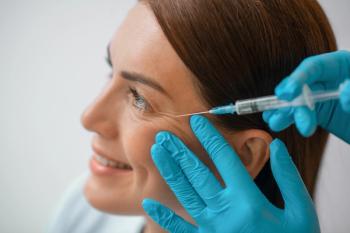
- Dermatology Times, September 2020 (Vol. 41, No. 9)
- Volume 41
- Issue 9
What we know (and don’t) about dietary effects on skin aging
While more evidence is required to really understand how diet impacts skin aging, some studies suggest a Mediterranean diet, changing cooking methods and decreasing sugar can positively impact skin aging.
Avoid sugars and browned meats, embrace Mediterranean diet, expert says
To minimize the impact of diet on skin aging, an expert suggests changing cooking techniques, embracing the Mediterranean diet and avoiding nutritional supplements except in situations involving specific deficiencies.
“We need more evidence to know for certain how diet impacts skin aging. Some studies suggest ways in which we may alter our diets that might help, but we need more large-scale studies before we can know the true impact of dietary patterns on aging,” says Emmy Graber, M.D., MBA. She is president and founder of The Dermatology Institute of Boston, PC, Boston.
Emerging evidence including a 2010 Clinics in Dermatology
“The glycation process of sugars attaching to collagen in the skin can have an impact on how we and the skin age,” Dr. Graber says.
More specifically, she says, cross-linked collagen created by this process is unable to repair itself as it normally would, resulting in stiffer, older-looking skin. Avoiding glycation also helps other organs age more gracefully.
Eating significant amounts of sugars can lead to the formation of advanced glycation end products (AGEs).
“We can also ingest already formed advanced glycation end products,” she says. “These exogenously formed advanced glycation end products often result from high-temperature cooking techniques such as grilling, frying and roasting.”
When foods cooked in these ways are eaten, AGEs are deposited in the skin.
“Some small studies suggest that avoiding these methods of cooking may be preferential to prevent aging skin,” she says.
Instead, poaching, boiling or steaming foods may be safer.
Similarly, small studies suggest that the Mediterranean diet may help slow down skin aging.
“Mediterranean diets are rich in fruits, vegetables, fish and olive oil, low in sugars and lower in meats and refined carbohydrates,” she says.
Dr. Graber advises caution regarding nutritional supplements.
“People always ask, ‘if I can’t change my diet, could I take a vitamin or supplement?’”
Because supplements are not regulated by the FDA, she says, it is very difficult to measure both the dose and the effectiveness in any study.
“As dermatologists, we should not be recommending supplements at this time unless a patient is deficient in a certain vitamin,” she says.
The take-home message, says Dr. Graber, is that if patients want to alter their diet for antiaging advantages, she recommends the Mediterranean diet because it has the most evidence in this regard.
“I also recommend lowering their sugar intake and changing their cooking methods to avoid high-temperature cooking methods, looking more towards steaming or boiling foods,” she says.
DISCLOSURE:
Dr. Graber reports no relevant financial interests.
REFERENCE:
1 Danby FW. Nutrition and aging skin: sugar and glycation. Clin Dermatol. 2010;28(4):409-11.
Articles in this issue
over 5 years ago
Will OSHA cite me for requesting employees not wear masks?over 5 years ago
How safe are cosmetics?over 5 years ago
Pretreatment punch technique guides safe injectionover 5 years ago
Microbiome-based treatments not ready for prime timeover 5 years ago
Emerging options for high-risk melanomaover 5 years ago
Phenotypes inform management optionsover 5 years ago
AI has potential to improve melanoma detectionover 5 years ago
Autoantigen array identifies IgG4 anti-gliadin autoantibodyNewsletter
Like what you’re reading? Subscribe to Dermatology Times for weekly updates on therapies, innovations, and real-world practice tips.











